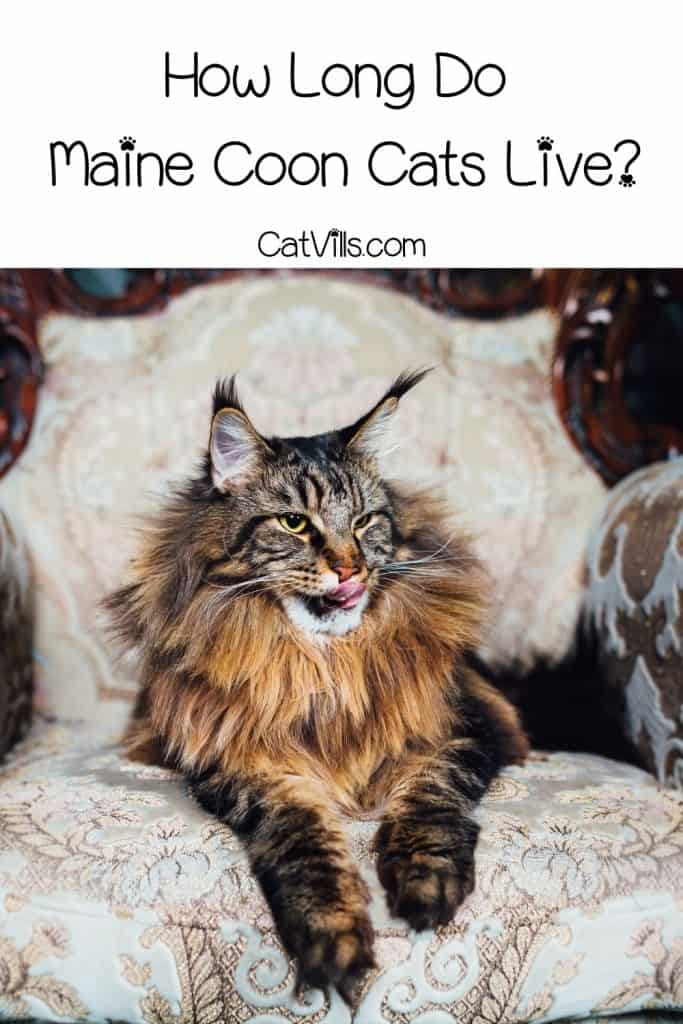Last Updated: 1 year ago
If you own the world’s biggest cat, or if you just happen to be a fan, you may be wondering, “What is the Maine Coon’s lifespan?”
Maine Coons are generally a hardy breed with reasonably few health issues.
Nevertheless, the average life expectancy of this long-haired breed is moderate, but not quite as long as we might think.
Luckily, we can do much to extend the Maine Coon’s life expectancy and set them up for a long, happy life with proper care.
How Long Does a Maine Coon Live?
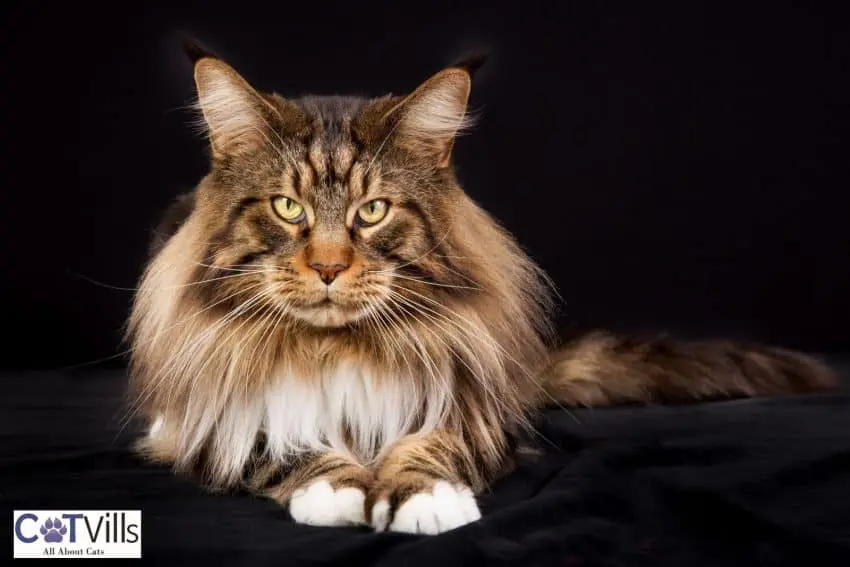
How long do Maine Coons live? Short answer: roughly 12–16 years. Now, the longer answer, because it’s not really that straightforward.
Unlike the Siamese cat lifespan of between 12 and 20 years, the average lifespan of the Maine Coon cat is usually a bit shorter.
There is no exact data, but a study by a Swedish pet insurance company estimates that the Maine Coon’s life expectancy is at least 12.5 years.
The study found that 74% of Maine Coons lived over 10 years, while 54% lived over 12.5. The study didn’t involve cats over 13 years old, so an exact average could not be established.
Although they are a healthy breed, like all purebreds, they do tend to suffer more genetic diseases than a mixed breed of cat.
This is partly due to what is known as “hybrid vigor,” since purebred domesticated breeds tend to have a smaller gene pool. So they often have more genetic predispositions to health issues.
For this reason, it is essential to seek out reputable breeders when looking for a Maine Coon.
Never go to a backyard breeder. Hereditary issues can severely affect how long your Maine Coon cats live, as well as their quality of life.
How Long Do Female Maine Coon Cats Live?
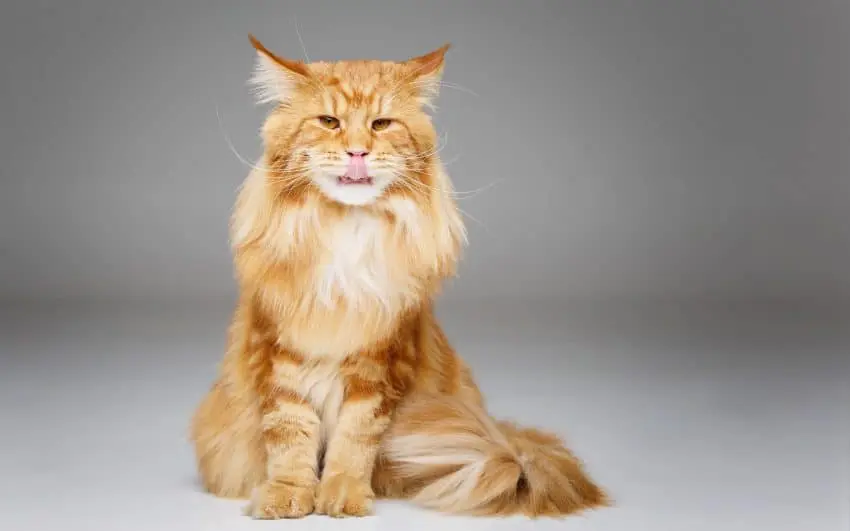
The female Maine Coon’s life expectancy is considered to be well over 12.5 years.
Most female cats should live to be around fifteen or sixteen, barring any accidents or genetic diseases.
Many cats will live longer than this and may go on into their twenties. On the other hand, some Maine Coon experts put their life expectancy lower and suggest they only live between 9 and 13 years.
Nevertheless, plenty of anecdotal evidence exists of female Maine Coons aged 17, 18, and even 20 years old. Keep in mind that spayed females live 39% longer than non-paid females.
How Long Do Male Maine Coon Cats Live?
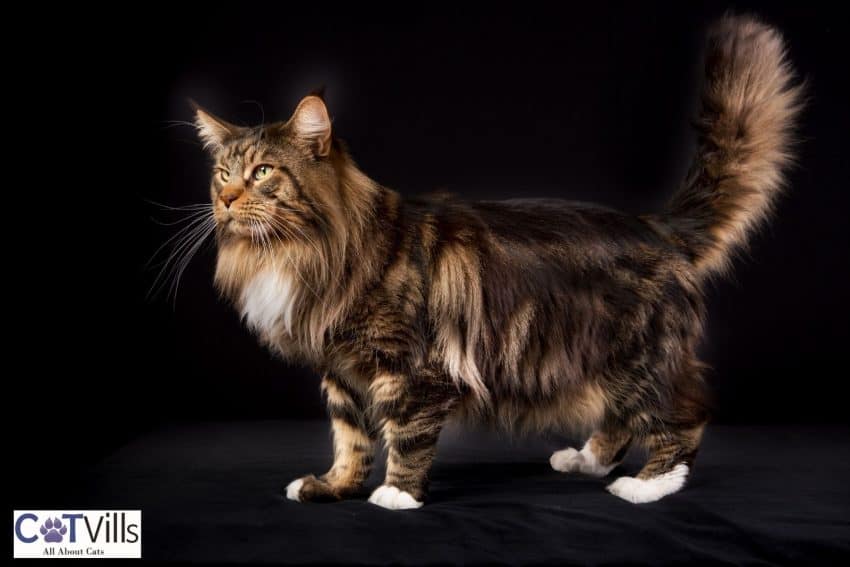
There is no statistical evidence that male Maine Coons live longer or shorter lives than females. So, in theory, they should live well into their teens, just like females.
In fact, the oldest Maine Coon, Rubble, was male and lived to be 31 years old! Nevertheless, other factors might mean that male Maine Coons might live shorter lives.
Statistical evidence suggests that male Maine Coons are more prone to hip dysplasia, which can affect the quality of their lives and even their longevity.
Another problem is that male cats generally tend to be more inclined to urinary tract problems and digestive disorders.
Renal or kidney failure is one of the leading causes of death in older Maine Coons, so this may impact their lifespan.
Another issue is if your male Maine Coon is not an indoor cat. While being a cat with access to the outdoors can circumvent the problem of a lack of exercise, it can also be a huge risk.
While female cats love to roam as well, they usually do not travel as far away from home.
Maine Coons are natural hunters and can easily get themselves into trouble in the great outdoors, patrolling their territories.
Unneutered male cats may also go looking for feral females and tend to wander even further.
This could lead to accidents, exposure to toxins, and other dangers. In fact, neutered male cats live an average of 62% longer than unneutered ones.
Do Maine Coons have health problems?
Maine Coons are healthy overall, so you don’t have to worry about taking them in for emergency vet visits. However, there are some hereditary diseases they might experience.
Your vet can scan for these issues and keep you informed so you know how to treat them to prevent pain.
Maine Coons are susceptible to health problems such as:
- Hip dysplasia
- Hypertrophic cardiomyopathy
- Obesity
- Periodontal disease
- Polycystic kidney disease
- Spinal muscular atrophy
- Stomatitis
Some of these issues aren’t life-threatening, so your Maine Coon can still live a good life if you keep it comfortable. Other disorders might require medication or surgery to be managed.
Genetic predisposition a Maine Coon Breeders should screen for
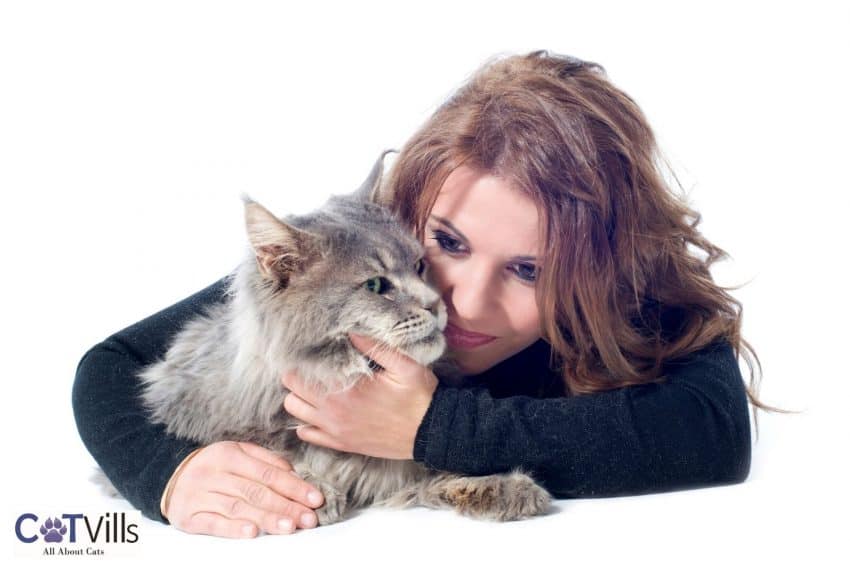
Hypertrophic cardiomyopathy (HCM)
When it comes to the official state cat of Maine, no reputable breeder will allow a cat that carries the mutated gene for HCM to breed.
This is a common heart disease that involves the thickening of the heart muscle.
There are no completely HCM-free lines, but a good breeder will screen her breeding cats for HCM before allowing them to breed.
Spinal Muscular Atrophy (SPM)
A DNA test exists for this disease. SPM involves the death of the neurons along the spinal cord, which are needed for the cat’s limbs and trunk to work.
Early signs of this degenerative disease include an unsteady gait with a swaying rear end and trouble jumping.
Hip Dysplasia
Hip dysplasia is inflammation in the hip joint that often plagues large breeds of cats and dogs.
It happens when the joint ligaments are lax enough to allow the head of the femur to edge out of the socket or if the bones themselves aren’t quite in the right shape.
This causes the femur head to create friction with the corners of the socket. Over time, this causes inflammation and eventually osteoarthritis.
Cats and kittens with dysplasia may be only mildly affected, although this condition often worsens as they age.
Do Maine Coons like to cuddle?
The stereotype of cats is that they’re standoffish and don’t like to cuddle with their owners. However, all cats have unique personalities, so your cat may love to cuddle or prefer to spend its time alone.
They also have moods, like people do, so your cat may be cuddly at certain times of the day and independent at others.
Maine Coons are very cuddly pets. They love when you touch, pet, and brush them. If you want to sit down and relax, your Maine Coon will often come to cuddle on your lap or sit beside you.
This level of affection makes them excellent pets for people who want a loyal companion.
How To Help Maine Coon Cats Live Longer
Things You SHould Do
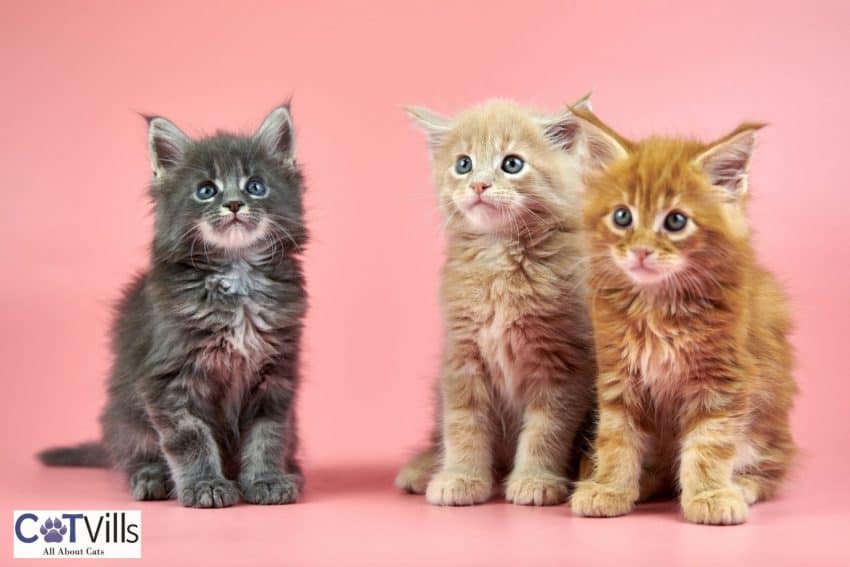
- Make sure your Maine Coon gets plenty of regular exercise. Whether it’s chasing a laser or pouncing on a teaser wand lure, cats need to move. After all, they are apex predators.
- Movement improves lean muscle mass, leads to happier cats, and controls weight. One of the Maine Coon personality traits is being a gentle giant, and it is one of the most intelligent cat breeds. So getting a harness and teaching your cat to walk on a leash can help them lead a healthy life.
- Do provide your cat with plenty of mental stimulation. Keeping the brain active through games and activities reduces cognitive decline later in life.
- Do provide your Maine Coon with a quality, nutritionally balanced diet. Remember, cats are obligate carnivores, so the bulk of their food should come from quality meat and organs.
- Avoid additives, fillers, artificial preservatives, artificial flavors, or colors in your cat’s food. Dry food is difficult for cats to digest and can cause kidney and liver problems over time, so look for fresh raw, frozen raw, or healthy wet foods.
- Omega-3s and vitamin E can reduce inflammation in their bodies, but make sure their food is nutritionally balanced to avoid deficiencies of vital nutrients such as taurine.
- Reduce stress in your Main Coons lives. Chronic stress because of boredom, a loud household, barking dogs, or other stressors can mean your cat is constantly receiving doses of stress hormones like cortisol and adrenaline. Over time, this can lead to inflammation, a compromised immune system, and other health problems.
Things You Should Avoid
- Don’t allow your Maine Coon to become overweight or inactive. Obesity in cats can lead to many severe health problems, such as inflammation, arthritis, and diabetes. A healthy weight is crucial to their wellbeing.
- Do not skip vet visits. A kitten should visit a vet regularly in the first six months for checkups and vaccinations. They should also start a regular deworming routine and be treated for disease-carrying ticks, fleas, and mites.
- Healthy adults should see the vet every year, and after your cat turns 10, make sure to see the vet every 6 months to catch any potential health problems early.
- Don’t neglect to groom. Matted hair can cause infections and inflammation. Also, removing the excess hair and dirt can help prevent hairballs.
- If you struggle with grooming, see your vet about a remedy for hairballs. Older cats also need to have their claws trimmed more regularly to prevent them from becoming overgrown.
- Also, remember to keep an eye on the ear, eye, mouth, and anal hygiene.
- Do catproof your house. Make sure no dangerous chemicals or power cords are lying around.
- Don’t neglect their teeth. Bad teeth cause inflammation in the jaw and gums and send bacteria into the bloodstream, causing bodily inflammation, heart problems, and possibly even diabetes.
- Don’t ignore any changes in behavior. If your cat is suddenly more lethargic, uninterested in food, or doing anything a bit unusual, it’s best to take a trip to the vet.
FAQs
How LONG DO Maine Coons LIVE INDOORS?
Depending on the health and genetics of the cat, the lifespan of indoor Maine Coon cats should be longer than that of outdoor Maine Coons.
By staying indoors, they are less likely to have an accident, such as being hit by a car or mauled by a dog. They are also less exposed to chemicals and toxins. So, in theory, an indoor Maine Coon should live well past 15 years.
However, suppose the indoor cat is overweight or has health problems, such as urinary tract issues. In that case, their lifespan could be significantly shortened.
DO MAINE COON CATS HAVE A LONG LIFESPAN?
Maine Coons are usually healthy and robust, but they are generally not the longest living cats.
Nevertheless, they usually live well into their teens, with some reaching their early twenties. Therefore, owners should always be prepared to have a pet with them for many years to come.
HOW OLD IS THE OLDEST MAINE COON CAT?
The oldest Maine Coon in the world was Rubble, who also happened to be one of the oldest cats in the world.
Rubble lived to be 31 years old and passed away in England in May 2019. Rubble was a gift to his owner for her 20th birthday, and he lived with her till she was 52.
Can a Maine Coon live for 20 years?
While data shows that a Maine Coon typically lives for 12.5 to 15 years, owners of this type of cat have reported that their pets live 20 years or longer.
The oldest Maine Coon died at 31 in 2020, so you can look forward to a long, joyful life with your fur baby.
Do Maine Coons live longer than other cats?
Maine Coons typically have a lifespan similar to that of other cat breeds. While there are some outliers, like the 31-year-old Maine Coon, most cats live up to 15 years.
Taking care of your cat with healthy food, exercise, and plenty of love can ensure they live great lives, regardless of how long they live.
Conclusion
The exact median lifespan of the Maine Coon cat is unknown, but healthy cats without any genetic conditions tend to live well past 12.5 years.
15 or 16 is the average lifespan of a Maine Coon cat, but some do live as far as their late teens and early twenties.
With proper attention to good breeding, genetics, diet, exercise, and routine care, you can usually prolong your Maine Coon’s life.
Did you have a Maine coon? How old is she or he now? Please let us know in the comments below!
